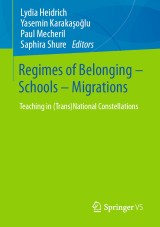Details

Regimes of Belonging - Schools - Migrations
Teaching in (Trans)National Constellations|
85,59 € |
|
| Verlag: | VS Verlag |
| Format: | |
| Veröffentl.: | 14.12.2021 |
| ISBN/EAN: | 9783658291891 |
| Sprache: | englisch |
| Anzahl Seiten: | 455 |
Dieses eBook enthält ein Wasserzeichen.
Beschreibungen
<p>This edited volume aims to critically discuss in how far the national orientation of schools and teacher education is appropriate in light of increasing migration and transnationality. The contributions offer ideas from teacher education research and school pedagogical practice in different nation-state contexts such as Austria, Canada, Chile, Greece, Israel, Japan, Switzerland, Turkey, the UK, and the USA. They ask which empirical and theoretical approaches are suitable for describing the phenomena of pedagogical-professional dealings with migration-related and transnational demands on schools. In raising this question, they do not reduce the analytical focus on migrants, their migration paths, actions or attitudes. Instead, the authors analyse the global interconnectedness and entanglements – each embedded in their specific national and global societal power structures and hierarchical relationships – and the country-specific and transnational structures and contextual conditionsof schools and teacher education.<br></p><p><br></p><br><p></p>
<p>Migration, Transnationalities and Regimes of Belonging.- Othering, Identities, Power Relations.- Schools, Societies, Pedagogies.- Teacher Training, Knowing How, Knowing What.</p><p><br></p>
<p><b>Lydia Heidrich</b> is a research assistant and PhD candidate at the Faculty of Pedagogy and Educational Sciences at the University of Bremen, Germany.</p><p><b>Dr. Yasemin Karakaşoğlu</b> is a Professor at the Faculty of Pedagogy and Educational Sciences at the University of Bremen, Germany.</p><p><b>Dr. Paul Mecheril</b> is a Professor at the Faculty of Education at Bielefeld University, Germany.</p><p></p><p><b>Dr. Saphira Shure</b> is a research assistant at the Faculty of Education at Bielefeld University, Germany.</p><p><br></p>
<p>This edited volume aims to critically discuss in how far the national orientation of schools and teacher education is appropriate in light of increasing migration and transnationality. The contributions offer ideas from teacher education research and school pedagogical practice in different nation-state contexts such as Austria, Canada, Chile, Greece, Israel, Japan, Switzerland, Turkey, the UK, and the USA. They ask which empirical and theoretical approaches are suitable for describing the phenomena of pedagogical-professional dealings with migration-related and transnational demands on schools. In raising this question, they do not reduce the analytical focus on migrants, their migration paths, actions or attitudes. Instead, the authors analyse the global interconnectedness and entanglements – each embedded in their specific national and global societal power structures and hierarchical relationships – and the country-specific and transnational structures and contextual conditionsof schools and teacher education.</p><p> </p><p><b>The editors</b></p><p><b>Lydia Heidrich</b> is a research assistant and PhD candidate at the Faculty of Pedagogy and Educational Sciences at the University of Bremen, Germany.</p><p><b>Dr. Yasemin Karakaşoğlu</b> is a Professor at the Faculty of Pedagogy and Educational Sciences at the University of Bremen, Germany.</p><p><b>Dr. Paul Mecheril</b> is a Professor at the Faculty of Education at Bielefeld University, Germany.</p><p> </p><p><b>Dr. Saphira Shure</b> is a research assistant at the Faculty of Education at Bielefeld University, Germany.</p>
Migration and schools in a transnational perspective Reflecting upon the national orientation of schools and teacher education in various nation-states Questioning methodologicial nationalism in empirical research
<p>This edited volume aims to critically discuss in how far the national orientation of schools and teacher education is appropriate in light of increasing migration and transnationality. The contributions offer ideas from teacher education research and school pedagogical practice in different nation-state contexts such as Austria, Canada, Chile, Greece, Israel, Japan, Switzerland, Turkey, the UK, and the USA. They ask which empirical and theoretical approaches are suitable for describing the phenomena of pedagogical-professional dealings with migration-related and transnational demands on schools. In raising this question, they do not reduce the analytical focus on migrants, their migration paths, actions or attitudes. Instead, the authors analyse the global interconnectedness and entanglements – each embedded in their specific national and global societal power structures and hierarchical relationships – and the country-specific and transnational structures and contextual conditionsof schools and teacher education.<br></p><p><br></p>
Diese Produkte könnten Sie auch interessieren:

Lehrer:innenbildung und Schulpraxis im internationalen Kontext

von: Manuela Hackel, Winnie-Karen Giera, Jana Buschmann, Tom Fischer

30,99 €

Assessment metakognitiver Fähigkeiten in der akademischen Bildung

von: Eibe Christian Behrens

13,99 €














